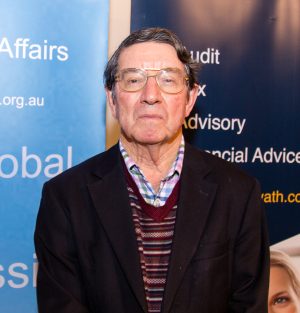Achieving Lasting Political Reform in Myanmar
At Glover Cottages on Tuesday 30 May 2017, our distinguished guest, Trevor Wilson, former Australian ambassador to Myanmar (2000 – 2003), discussed the current political and economic situation in Myanmar and the transition it has undergone in the last few years. He began his talk by discussing the country’s first major step towards political transition, which occurred in November 2010 with the general election. Though these were not ‘free and fair’ elections as the voting processes were inadequate and ballot boxes were rigged, a two-house parliament was established for the first time in 40 years. From here, the second noteworthy political step in Myanmar’s political transition occurred in April 2012 during by-elections, with an easing-up of censorship restrictions and a greater participation by the country’s political parties.

Trevor noted that significant reforms still need to be properly consolidated before major progress is made. These include the transfer of authority from the Army to state bodies, which must include more funding, staff and expertise. And as US sanctions still applied to Myanmar up until September 2016, consolidation still requires deep institutional changes to deliver more permanent reforms. Furthermore, although the government was given a clear ‘mandate’ from the 2015 elections, Trevor notes that it still hesitates to adopt nationwide policies in many areas. For example, the government is yet to produce a finalised national peace process plan, nor proposals for nationwide judicial reforms or comprehensive land reforms. Trevor asserts that there seems to be too much uncertainty over significant areas of policy that must be addressed.
Therefore, international observers must be patient with the country because reforms in Myanmar will require time to take hold, due to the need for them to become embedded and adjusted to local conditions. With regards to the international community, Trevor believes that the country is very receptive to ideas and suggestions on its political transition, though any decisions must ultimately be made by the Myanmar people and their representatives. From an international perspective, more attention should be directed towards the completion of infrastructure links with the rest of Asia for both socio-economic and political reasons.
Trevor concluded the talk by suggesting that Myanmar still has a long way to go before its political and economic transition is complete. And for this process to occur, the local people must become more flexible, responsive and cohesive with one another. The outlook for Myanmar is more optimistic than it has been in decades, so watch this space as the country continues to evolve.
Report by Phillip Alphonse